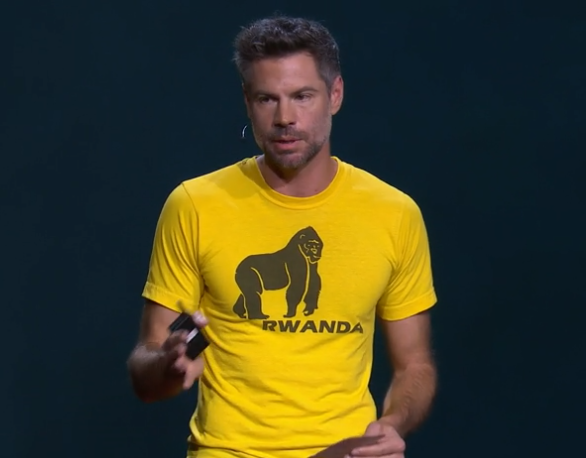And what about the waste? Everyone worries about the waste.
那来自核能的废物呢?每个人都在担心废料。
Well, the interesting thing about the waste is how little of it there is. This is just from one plant.
但是有趣的是,产生的废物其实只有一点儿。这就是由一个核电站产生的废料。
If you take all the nuclear waste we've ever made in the United States,
如果你把美国核电站产生的所有废物加起来,
put it on a football field, stacked it up, it would only reach 20 feet high.
放到一个橄榄球场地堆积起来,只有6.1米高。
And people say it's poisoning people or doing something -- it's not, it's just sitting there, it's just being monitored.
人们说废物会对人体或其他事物产生伤害--但它并不会,只是被堆积在那里,并有人监管着。
There's not very much of it. By contrast, the waste that we don't control from energy production -- we call it "pollution,"
而且量并不大。相反,我们没有控制的发电产生的废物,我们称之为“污染”,
and it kills seven million people a year, and it's threatening very serious levels of global warming.
一年内七百万人死于此,而且它威胁着世界,大大加重气候变暖。

And the truth is that even if we get good at using that waste as fuel, there's always going to be some fuel left over.
事实上,如果我们能够很好地把废物当成燃料,世界上总会有剩余的燃料。
That means there's always going to be people that think it's a big problem
这就意味着总会有人认为这是一个大问题,
for reasons that maybe don't have as much to do with the actual waste as we think.
因为我们可能没有能够在预期之内很好的利用废物。
Well, what about the weapons?
好,那武器呢?
Maybe the most surprising thing is that we can't find any examples of countries that have nuclear power and then,
可能最令人惊讶的是我们找不到任何例子,没有哪个拥有核能的国家突然说,
"Oh!" decide to go get a weapon. In fact, it works the opposite.
“哦”,然后决定要制造一个武器。事实正相反。
What we find is the only way we know how to get rid large numbers of nuclear weapons
我们发现,唯一能使我们摆脱大量核武器的途径,
is by using the plutonium in the warheads as fuel in our nuclear power plants.
就是把弹头中的钚当成反应堆中的燃料。
And so, if you are wanting to get the world rid of nuclear weapons, then we're going to need a lot more nuclear power.
因此,如果你想让世界没有核武器,就要使用更多的核电。












